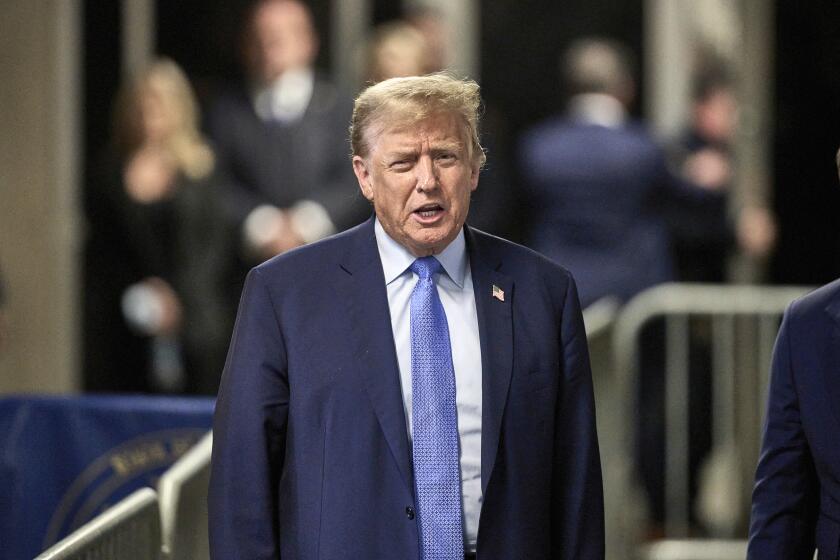Republican candidates make a list of demands for future debates
By the numbers
Welcome to Trail Guide, your daily host through the wilds of the 2016 presidential campaign. It's Sunday, Nov. 1, and this is what we're watching:
- Down in the polls and lagging in fundraising, Jeb Bush said on NBC's "Meet the Press" that his campaign is doing fine and is in a good position three months before Iowa.
- Bernie Sanders begins November by unveiling his first campaign ad.
- Representatives from GOP presidential campaigns huddle in Virginia to map out a unified message on what they'd like to see in debates moving forward after last week's CNBC-sponsored debate. The Republican National Committee has been barred from the meeting.
- GOP presidential candidates gathered in Iowa on Saturday for some Halloween campaigning.
- Marco Rubio is a guest on CBS' "Face the Nation."
GOP presidential campaigns agree to some debate changes
Republican presidential candidates have agreed on a series of demands giving them greater control of debates, as the GOP's frustrated 2016 class works to inject changes into the nominating process.
They are attempting to wrestle command from the Republican National Committee and media hosts.
Representatives from more than a dozen campaigns met behind closed doors for nearly two hours Sunday night in suburban Washington, a meeting that was not expected to yield many results given the competing interests of several candidates. Yet they emerged having agreed to several changes to be outlined in a letter to debate hosts in the coming days.
They include largely bypassing the RNC in coordinating with network hosts, mandatory opening and closing statements, an equal number of questions for the candidates, and preapproval of on-screen graphics, according to Ben Carson campaign manager Barry Bennett, who hosted the meeting.
“The amazing part for me was how friendly the meeting was,” Bennett said, noting the private gathering was held in a room marked “family meeting.” “Everybody was cordial. We all agreed we need to have these meetings more regularly.”
The GOP's most recent debate, moderated by CNBC in Boulder, Colo., on Wednesday night, drew harsh criticism from campaigns and GOP officials alike. Afterward, some candidates complained that the questions were not substantive enough; others wanted more airtime or the chance to deliver opening and closing statements.
RNC Chairman Reince Priebus decided to suspend a partnership with NBC News and its properties on a debate set for February, but that wasn't enough to satisfy the frustrated campaigns.
“We need to mature in the way that we do these debates if they're going to be useful to the American people,” Carson told ABC's “This Week.”
Although the campaigns agreed to the changes in principle Sunday night, the media companies that host the debates are under no obligation to adopt them. Bennett suggested that campaigns could boycott debates to get their way.
“The only leverage we have is to not come,” he said.
The pushback comes despite a high-profile effort by the Republican National Committee to improve the debate process going into the 2016 election season. The party said the 2012 debate schedule promoted too much fighting among candidates, so for 2016, the RNC dramatically reduced the number of debates for this election and played a leading role in coordinating network hosts and even moderators, in some cases.
Three debates remain before the first nomination contest, the Iowa caucuses on Feb. 1; the next one is scheduled for Nov. 10 in Milwaukee. The RNC has sanctioned five debates after the caucuses.
“What it really comes down to is the candidates want to have more control of the ability to negotiate with the networks,” Donald Trump campaign manager Corey Lewandowski said after the meeting.
Although organizers of the meeting were not including the RNC, the party has been in regular communication with campaigns about their concerns.
Shortly before the meeting, the RNC appointed Sean Cairncross, the committee's chief operating officer, to take the lead in negotiating with the networks. It's unclear, however, what role he'll play should the campaigns get their way.
“This is the first step in the process of understanding what the candidates want, and then we need to have a more specific conversation about NBC,” RNC chief strategist Sean Spicer said Sunday ahead of the meeting. “We need to start a process. Tonight's the first step.”
Some candidates are trying to use the debate discord to their advantage — none more than Texas Sen. Ted Cruz.
Campaigning in Iowa this weekend, he slammed the CNBC debate moderators for asking questions in a way that he said “illustrate why the American people don't trust the media.” He was cheered after calling for future debates to be moderated by conservatives such as radio host Rush Limbaugh.
-- Associated Press
Marco Rubio unmoved by comparison to President Obama
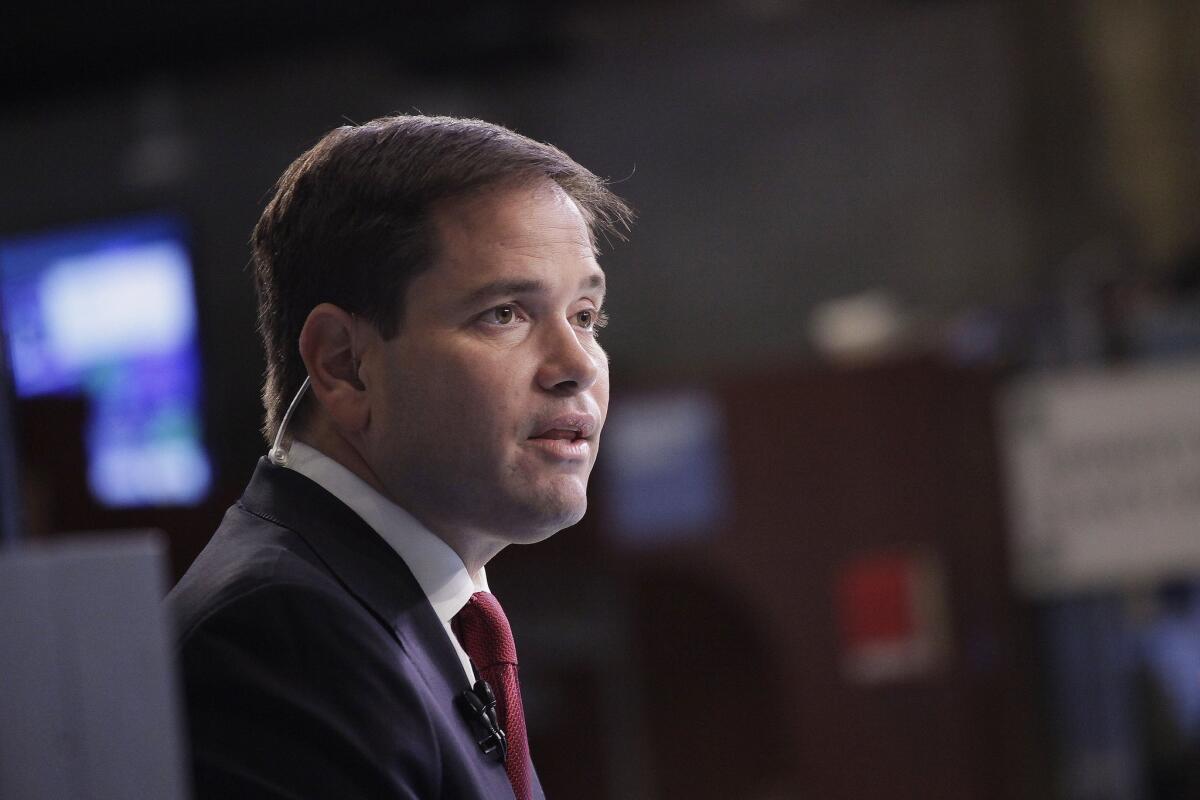
Marco Rubio does not believe his short stint in the Senate should be a factor in his candidacy for the Republican presidential nomination.
Despite some rivals , such as former Florida Gov. Jeb Bush, questioning his attendance record in the Senate, Rubio said his work speaks for itself and is resonating with voters in early nominating states.
“There is no office in the world like the United States presidency. What I have shown over the last five years is judgment, good judgment, and understanding of the major issues before America,” he said Sunday on CBS’ “Face the Nation.”
Recently some surrogates for Bush, a onetime Rubio ally and now a rival as they both seek the GOP nod, have dubbed the Florida senator a “Republican Obama.” (Obama, like Rubio, was a first-term senator when he ran for the White House).
“Look, campaigns are going to say whatever they think gives them an advantage. And obviously someone has convinced Jeb that attacking me is going to help his campaign. It won't change the way we run our campaign,” Rubio said. “We're going to give people a serious candidacy that's optimistic but also realistic about America's future, about our challenges, about the direction our country needs to go. That's what I'm going to focus on.”
In the interview, Rubio, who is a member of the Senate Foreign Relations Committee, said he supported President Obama’s decision to send 50 members of U.S. special operations forces into Syria to help fight Islamic State extremists.
“I don't have a problem with the tactics of it. And the numbers might even have to be larger at some point. But I think the bigger issue is, can they arrive at a strategy? And that's what I think the administration is still struggling to outline,” he said.
Kasich campaign doesn't want changes to debate format until after Nov. 10 gathering
How California Republicans and Democrats differ from those nationally
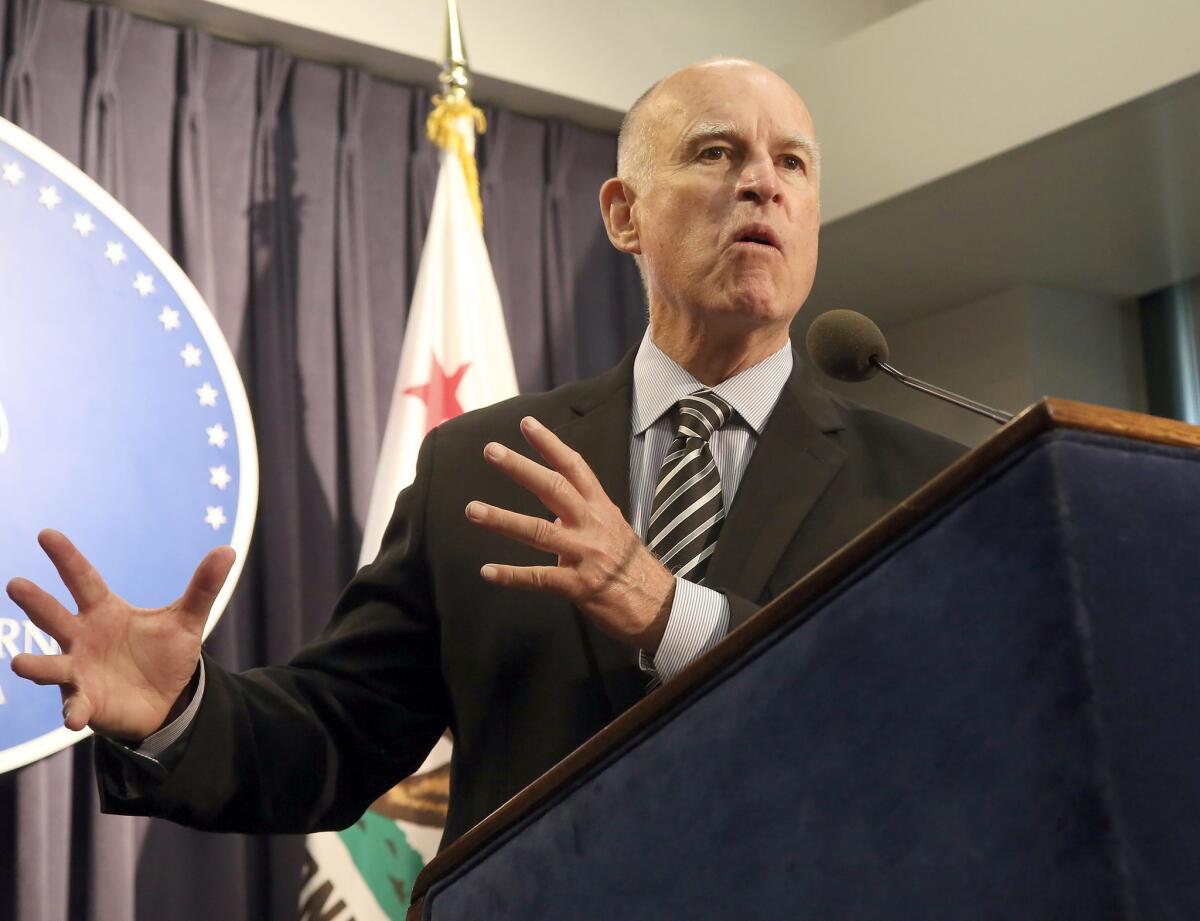
California Gov. Jerry Brown acted on a bill to help immigrants who are in the country illegally with visas if they are a crime victim or witness.
For decades, Californians prided themselves on cutting the path to be trod later by national political figures. Ronald Reagan rose first on the West Coast and spread eastward with his election as president. The anti-tax movement likewise moved from west to east, grounded by the historic approval of Proposition 13's property tax limitations in 1978.
This year, the state's Democrats and Republicans are moving, in some key ways, in exactly the opposite direction from the national parties.
National Democrats, as a glance at the presidential contest demonstrates, are feeling intense pressure to move to the left. Hillary Rodham Clinton, hardly a conservative when left to her own devices, has moved left on criminal justice, immigration and economic policies as she seeks to put down a surprisingly strong challenge by an independent socialist, Sen. Bernie Sanders of Vermont.
Among Republicans vying for the 2016 presidential nomination, the race to the right has taken on the appearance of a stampede. Gone is the past support of some candidates for dealing with immigrants in the country illegally, or support of more moderate policy changes on healthcare or education.
Jeb Bush notes 'bumpy' patch in campaign, vows to move forward
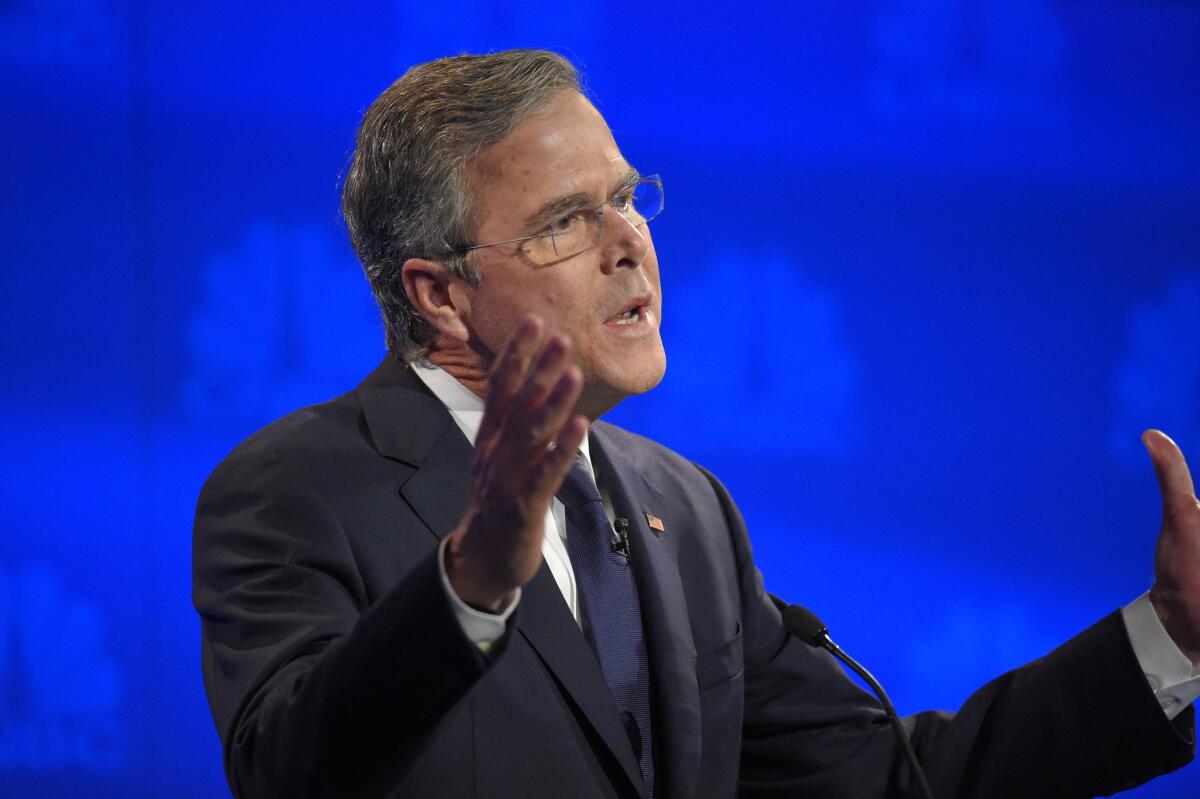
After a rocky week of criticism for a lackluster debate performance, Jeb Bush vowed on Sunday to charge forward in his quest for the Republican presidential nomination.
The former Florida governor in recent weeks has trimmed staff and shifted strategies three months ahead of the first nominating contest in Iowa.
“You’ve got to earn it,” he said Sunday on NBC’s "Meet the Press" of the party’s nomination as polls show him toward the middle of the crowded field. “And all of the tribulations of the campaign -- and we’re having our share; there’s no doubt about it -- I have enough self awareness to know this is the bumpy time of the campaign. This pales by comparison to being commander-in-chief.”
During last week’s debate, Bush, the one-time front-runner for the GOP nomination, went after Sen. Marco Rubio, challenging him on his poor attendance record this year in the Senate and calling on him to resign his seat. Rubio, a former protege of Bush, was prepared.
“I don’t remember you ever complaining about John McCain’s vote record,” Rubio said, noting that McCain missed even more votes when he ran for president in 2008. “The only reason why you’re doing it now is because we’re running for the same position, and someone has convinced you that attacking me is going to help you.”
Bush was caught off guard by the comeback and failed to recover for the rest of the debate. Moreover, his comments about regulating fantasy football were assailed by New Jersey Gov. Chris Christie, leaving another blemish on his debate performance.
“I know that I've got to get better at doing the debate," Bush said. "I mean, when I see that I'm not doing something well then I reset and I get better."
His performance on the debate stage has made donors anxious.
“I wouldn’t say it was a stellar performance by any means, but I do think we’re still a long ways away from when the first caucus and primary take place,” Susan McCaw, a major Bush fundraiser who lives in California, told The Times recently.
Since Bush formally announced his candidacy in June, he’s been dogged by his family legacy, having both a brother and a father who served in the White House.
So far this cycle, the GOP electorate has yearned for outsider candidates -- launching billionaire businessman Donald Trump and retired neurosurgeon Ben Carson to the top of the field.
But Bush seemed undeterred on Sunday.
“When I have these events where you're one on one, where you're listening to people, talking to people, town hall meetings that are growing in New Hampshire, I feel pretty good about where we are,” he said.
Bernie Sanders begins November with first TV ad
Vermont Sen. Bernie Sanders released his first television ad on Sunday, which will air in Iowa and New Hampshire.
In the minute-long spot, Sanders, who is vying for the Democratic presidential nomination, highlights his family's immigrant background and the work he's done in Congress for the middle class.
The ad buy, which the campaign says is around $2 million, hits TV screens about three months before the Iowa caucuses.
Sanders' chief rival for the nomination, front-runner Hillary Rodham Clinton, has been running ads for several months.
An Iowa Halloween filled with GOP jabs at Obama and Clinton
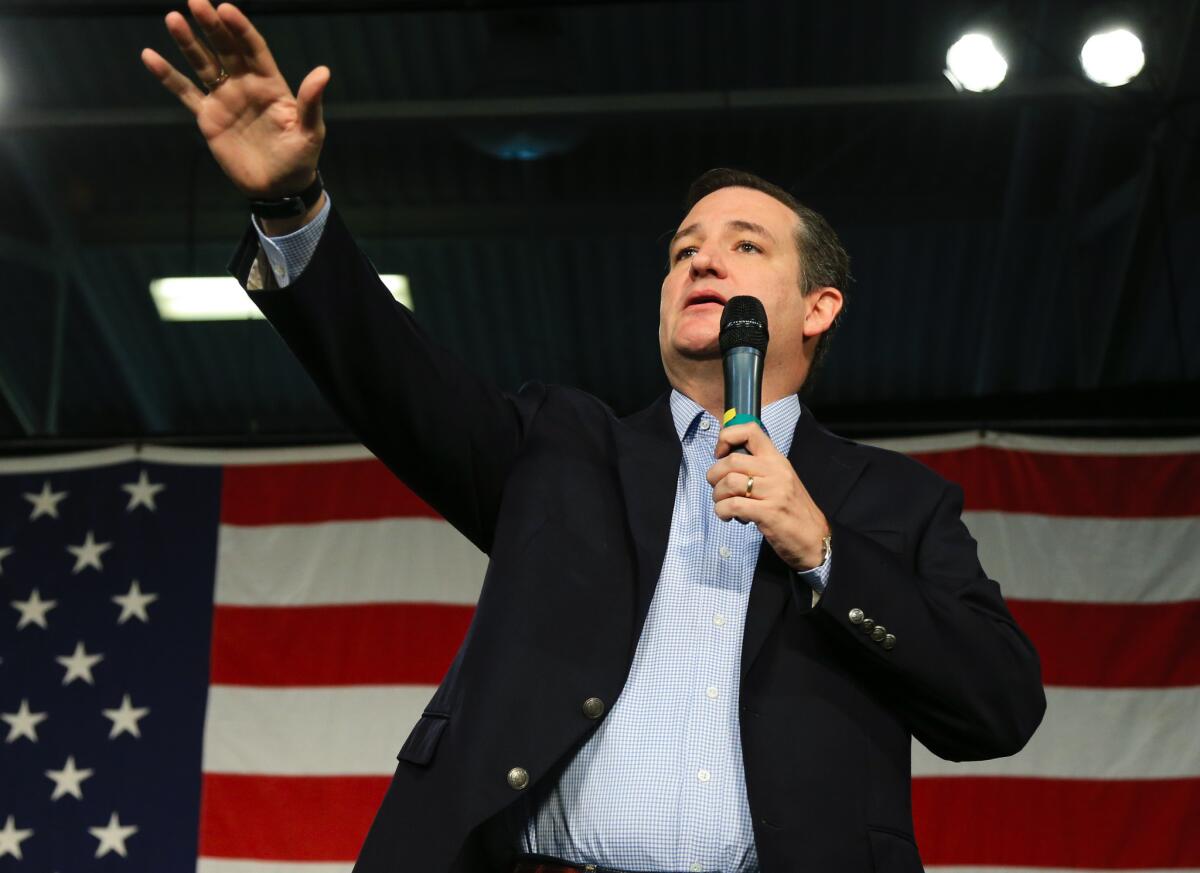
Republican Presidential candidate, Sen. Ted Cruz, R-Texas, speaks at the Iowa GOP’s Growth and Opportunity Party at the Iowa state fair grounds in Des Moines, Iowa, Saturday, Oct. 31, 2015. (AP Photo/Nati Harnik)
As most Americans dressed up in costumes and handed out candy to neighborhood children, more than 2,000 Iowans gathered at a presidential campaign event here Saturday for a GOP version of Halloween.
Zombies – the alleged result of Common Core education standards – dwelt at Texas Sen. Ted Cruz’s haunted house booth.
A graveyard with headstones for Obamacare, historic debt and Planned Parenthood funding decorated New Jersey Gov. Chris Christie’s space.
And at South Carolina Sen. Lindsey Graham’s table, Iowans picked the “scariest Democrat” by casting candy-corn votes in mason jars. (Democratic front-runner Hillary Rodham Clinton won by a wide margin).
By the numbers
Get the L.A. Times Politics newsletter
Deeply reported insights into legislation, politics and policy from Sacramento, Washington and beyond. In your inbox three times per week.
You may occasionally receive promotional content from the Los Angeles Times.
